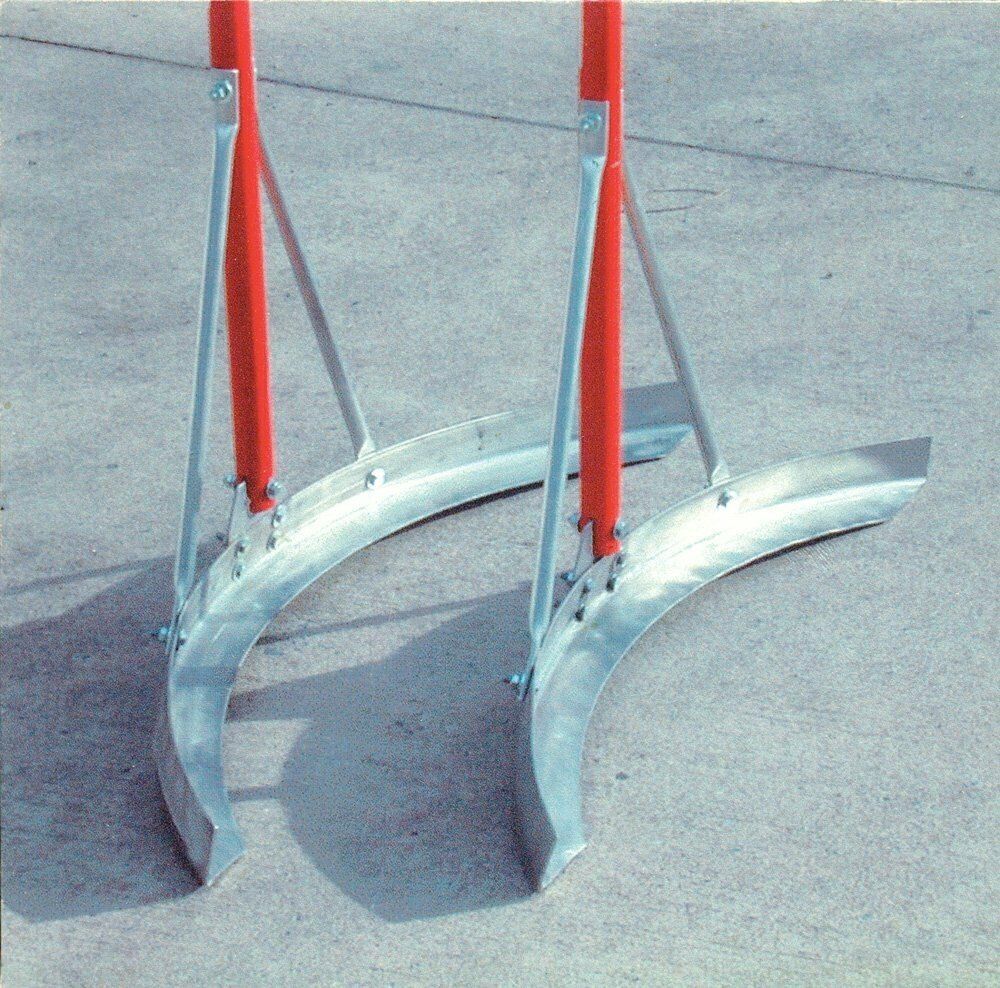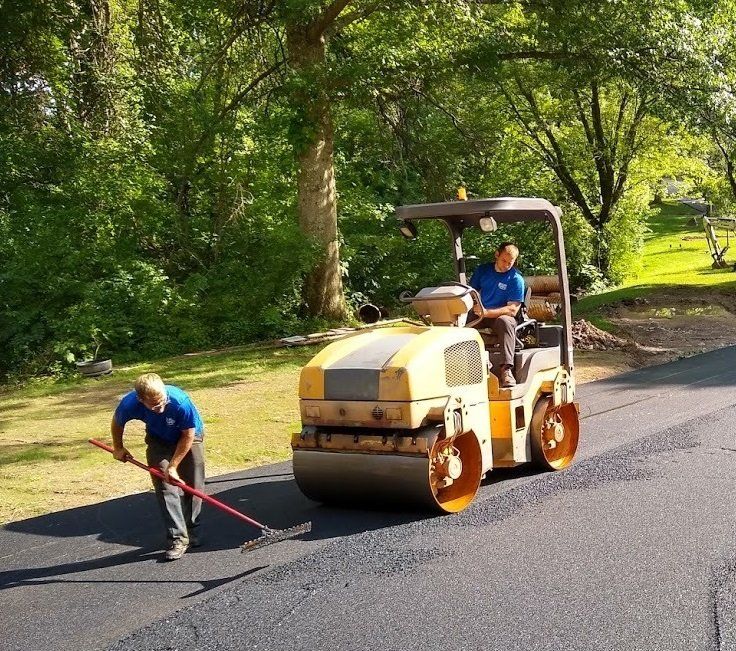Blog

In the world of construction and concrete work, efficiency and productivity are key. Every minute counts, and the quality of the tools used can have a significant impact on the outcome of a project. That's why ergonomic design has become a major consideration for custom concrete tools From handheld power tools to heavy machinery, the comfort and well-being of workers play a crucial role in their overall performance. Ergonomic design can not only enhance comfort but boosts productivity by reducing strain and fatigue. By incorporating features like adjustable handles, vibration dampening technology, and weight distribution systems, manufacturers are revolutionizing the way custom concrete tools are designed and used. In this article, Slip Industries will dig into the importance of ergonomic design for custom concrete tools exploring how it not only enhances the comfort of workers but also improves their productivity, leading to better overall outcomes and safer work environments. Understanding the importance of ergonomic design in concrete tools When it comes to concrete work, the physical demands on workers are immense. Operating heavy machinery, handling vibrating power tools, and repetitive motions take a heavy physical toll on the body. That's why ergonomic design is of enormous importance in this industry. Ergonomics focuses on designing tools and equipment that fit the user's body and movements, reducing the risk of musculoskeletal disorders and optimizing overall performance. Custom concrete tools that prioritize ergonomics look at factors such as grip, weight distribution, vibration reduction, and adjustability. By considering the human body's natural movements and limitations, manufacturers can create tools that are comfortable to use for extended periods, reducing strain and fatigue. This, in turn, leads to improved productivity and efficiency on the job site. The impact of ergonomic design on comfort and productivity The comfort of workers is not just a matter of personal preference; it directly affects productivity. Workers who are comfortable can focus on their tasks without being distracted by pain or discomfort. This allows for increased concentration, better accuracy, and faster completion of tasks. Ergonomic design also plays a significant role in reducing fatigue. By minimizing strain on the body, workers can maintain their energy levels throughout the day, leading to greater productivity. Additionally, ergonomic tools often require less force to operate, reducing the risk of muscle strain or overexertion.

Are you tired of dealing with subpar tools that slow down your construction projects and compromise the quality of your work? It's time to invest in high-quality tools that will take your construction projects to the next level. From power tools to measuring equipment, having the right tools in your arsenal can make a world of difference in terms of efficiency, accuracy, and overall project success. In this article, we will explore the top five benefits of investing in high-quality tools for your construction projects. From increased productivity and improved safety to enhanced durability and cost savings, these benefits will not only transform the way you work but also upgrade the standard of your projects. In the 30 years Slip Industries has been working with contractors and builders, we’ve come to an understanding that quality tools are the root of success. So, if you're ready to take your construction game to new heights, read on and discover how investing in high-quality custom construction tools online can revolutionize your work.

Concrete tools are essential for any construction project involving concrete. However, they can be a safety concern if the tools are not used properly. It is imperative to prioritize safety techniques when using concrete tools to prevent potential injuries or accidents. Here are seven key safety factors to consider when using concrete tools. Wear Proper Protective Equipment The first safety technique to implement when using concrete tools is to wear proper protective equipment. Some examples of protective equipment are: ● Gloves ● Eye Protection ● Hearing Protection ● Respiratory Protection Wearing protective safety equipment can help reduce the risk of injuries from dust, loud noises, or debris. Follow the Manufacturer’s Instructions Before using any type of concrete tool, always read the manufacturer’s instructions to make yourself aware of any potential hazards that could accompany the use of the tool. The instructions will also provide information on the proper usage of the tool and how to operate it safely. Carefully review the instruction manual for safety tips, safety gear to wear when using the tool on your project, and what to do in case of a malfunction. Inspect Your Tools Before Use Inspect every concrete tool thoroughly before use, whether it is new or used. Check for any signs of potential damage or wear and tear. Ensure that all the tools moving parts function appropriately and the blades are sharp. If you see any potential damage or malfunctions, do not use the tool. Repair or replace the tool first, as using a damaged tool could lead to an injury or accident. Use Tools as Intended Each concrete tool is designed to help with a specific task within the frame of the job. When using these tools, it is essential to use them for their intended use only. If you use the tool improperly or for a task that it was not designed for, you increase the potential risk of an injury or accident. A great example would be the concrete saw. It is intended to be used for cutting concrete. If you were to use this saw to cut wood or other materials, an accident or injury may occur, as well as potential damage to the tool itself. Maintain a Safe Distance Maintaining a safe distance from others is a crucial safety technique regardless of who is using the concrete tools. If you are working with concrete tools in an area with bystanders, keep them away from the work area to remain safe from any debris, dust, or exhaust. Maintain a Safe Working Environment When using concrete tools, make sure the working environment is also safe. If you are working indoors, make sure the area is well-ventilated and well-lit. Avoid using electric tools in wet or damp conditions, as this could increase the risk of electric shock. If you are working outside, clear the area of unneeded materials, tools, and debris. Safely Store Tools As important as it is to implement safety techniques when using tools, it is also essential to be safe when storing your concrete tools. Store your tools in a secure location out of reach of children. Ensure the tools are not in danger of falling or being damaged. Find Your Concrete Tools At Slip Industries , our concrete finishing tools are built to last. We design each instrument with a keen understanding of concrete work. We are a family-owned business that has been in the industry for over 30 years. Our American-made tools are backed by the very best materials and keen attention to detail. If you are located in Lancaster, Pennsylvania and are looking for well-made custom concrete tools with the rigor to stand up to any job, contact us today by calling (717) 665-2139 or emailing info@slipindustries.com . We will be happy to tell you more about the products we create and how they can help you work better.

Did you know asphalt has been an essential material in constructing and maintaining roads, buildings, and structures for thousands of years? With the increasing demand for road construction in the 20th century, the tools used to work with asphalt have evolved significantly. Let’s take a look at the evolution of asphalt tools from ancient times to the modern era, highlighting the major advancements and innovations that have shaped the asphalt industry. Ancient History of Asphalt Tools The ancient civilizations of Babylon and Egypt were actually some of the first to use asphalt as a building material. They used it to pave roads, build structures, and even waterproof their ships. However, the tools they used to work with asphalt were basic at best. They were made of stone, wood, and metal for mixing, spreading, and smoothing the asphalt. The 19th Century The industrial revolution in the 19th century brought new advancements in the manufacturing of tools. Asphalt was used more prominently in road construction, and new tools were developed to make the process easier and more efficient. For example, the invention of the steamroller completely revolutionized road construction by allowing for the efficient smoothing and compaction of asphalt. The 20th Century The 20th century saw a boom in road construction, with the advent of the automobile industry and the growth of cities. This led to the development of new tools and technologies to make the production and application of asphalt more efficient and effective. One of the most significant innovations of the 20th century was the asphalt paving machine, which allowed workers to lay large amounts of asphalt in a short amount of time. The steamroller continued to play a crucial role in the compaction of asphalt, helping to produce a smooth and durable road surface. As the 20th century progressed, new technologies and materials continued to drive the evolution of asphalt tools. The introduction of the asphalt saw allowed for the precise cutting of asphalt, making road maintenance and repair much easier. The asphalt cutter, which was used to remove and replace sections of asphalt, also became an essential tool in road construction and maintenance. The computer age brought about new advancements in the design and manufacturing of asphalt tools. The use of computer-aided design (CAD) software allowed engineers to create more precise and efficient tools. The introduction of computer-controlled paving machines, for example, allowed for the precise application of asphalt, resulting in a smoother and more uniform road surface. The 21st Century and Today In the early 21st century, GPS technology and sensors became more widespread in the asphalt industry. GPS technology allowed for the precise measurement and mapping of road surfaces, resulting in more accurate and efficient road construction and maintenance. Sensors and automation also had a significant impact on the asphalt industry, allowing for the monitoring and control of important parameters such as temperature, moisture content, and more. The development of new materials, such as warm-mix asphalt, also had a major impact on the asphalt industry. Warm-mix asphalt is a type of asphalt that can be produced and placed at a lower temperature, which reduces emissions and saves energy. This type of asphalt is becoming more common in road construction and maintenance, as it is more environmentally friendly and cost-effective. Hand-held asphalt tools have also continued to evolve by incorporating ergonomic designs and new materials for improved performance and reduced operator fatigue. The use of cordless technology, such as battery-powered saws and drills, has also become increasingly popular, providing greater mobility and convenience on the job site. In recent years, drones have become increasingly common in the asphalt industry. Drones can be used for quick and efficient inspections of road surfaces, providing detailed images and data that can be used to plan and execute road maintenance and repair. Drones can also be used to monitor the application of asphalt, allowing for more precise control of the paving process. The Future The future of asphalt tools looks bright, as new technologies and materials are continuously being developed. Asphalt companies are exploring the use of robotics and automation to further improve the efficiency and accuracy of the paving process. The use of 3D printing is also being explored, as it has the potential to produce custom asphalt tools and components quickly and cost-effectively. Searching for Tools that Work As a family-owned business with over 30 years of business, we at Slip Industries take pride in helping you do your best work on every job with our American-made asphalt tools ! Over the last few decades, we have gotten to know asphalt contractors. We know you need durable tools that can complete your project with precision. Buy our asphalt tools online or contact us today at (717) 665-2139 to learn more about the high-caliber tools we create and how we can help you complete your project!

Owning a small construction business can be one of the most rewarding feelings—perhaps even a dream come true. It also can have its roller coaster moments filled with ups and downs. However, there are certain things you can do to limit the roller coaster feeling and help your business to run smoother and thrive. Below we will explore our top five tips on how you can thrive as a small business in the construction industry. 1. Be Organized No matter how large or small a business is, organization is one of the most important areas to focus on because everything else depends upon it. Organization is not just a business plan or structure of your business. It extends beyond that, from your marketing plan to how your accounting is done. Here are some great strategies you can implement with your small business organization: ● Bookkeeping: Implement a system to track your revenue, expenses, receipts, and any other financial material related to your business. ● Timesheets: Have a structured timesheet system to track worker hours for how you complete your payouts. ● Job Management Tracking: Track the average hours on the specific type of construction jobs you perform to be most efficient in your time allotment and pricing. ● Documentation Tracking: Designate a place to house your documents in an orderly fashion to have easy access to job contracts, personnel contracts, policies and procedures, safety guidelines, insurance documentation, and business receipts. Disorganization can set your business behind. Staying organized and structured is key to making your small business thrive. 2. Build a Team When starting a small business, the initial launch period tasks may fall a lot on you. As you continue to grow your business, it is important to build a team that will help you be successful and thrive! Here are some team roles to consider when first building a team: ● Employees or Independent Contractors: Depending on your business structure, having people that work for you or can work with you on a job will help save time. Having quality people you can rely on will also allow you to focus on key aspects of your business to help it grow. ● Mentors: Find someone who has already accomplished what you want to accomplish and learn from them. A mentor can help you understand the business process better and help get you to where you want to be. Bringing on a team of individuals that you can trust and rely on when needed can do wonders for your business moving forward. 3. Outsource Work When Appropriate If you currently run a business or are thinking of launching a business, odds are that it is in a field you are an expert in or have knowledge about. This is the part of the business to focus on because it is the area you know best. Other parts of your business are equally important where other experts can help you so you can know it’s done right. This also frees up your time to focus on what you know best! Here are some areas where you can outsource some work: ● Legal ● Accounting ● Social Media ● Marketing Content Creation When outsourcing work, first have a budget in mind so you know what you can afford. Then you can make the best decision about what is the most important to start outsourcing. 4. Use Technology Whether we like it or not, agree or disagree, technology has changed the world and the way businesses are run. Even though construction companies involve a lot of hands-on work, technology has become a piece of the puzzle too. Some areas where technology can be beneficial for your day-to-day business functionalities are: ● Email communication and marketing ● Social media management applications ● Accounting platforms ● Industry-specific software ● Payment processing software There are a lot of programs and applications out there to choose from. Some are more costly than others, while some are free. Researching what technologies will best benefit your business and work within your budget is essential. 5. Communication Is Key We have touched on different areas to make your business thrive, but we saved the most important for last: communication! Communication is the number one aspect of every business. It involves the interactions with your team, potential customers, current customers, former customers, and anyone you encounter. It is common for customers to have questions in regards to construction projects. Respond to those questions in a timely manner. Let them know your hours beforehand so they know when they can contact you or expect a response. Customer service and communication can be what sets you apart from the competition. About Us We at Slip Industries are a family-owned business with over 30 years of experience working with contractors, builders, and the jobs they do. We love to interact with contractors and tradesmen as we value building lasting quality relationships. We have a wide variety of products we offer for asphalt , concrete , and masonry projects! Our team produces only the very best American-made products in the industry. If you are starting a job, no matter how big or small, we are here to serve you. Contact us today at (717) 665-2139 to learn more about our products and how we can help you complete your project!

As we enter the winter season, one of the biggest questions we hear is, “Is it safe to pour concrete in winter?” The short answer to this question is that yes, you can pour concrete during winter. However, there is more to it than a traditional pour, as there are certain precautions and considerations you will need to take to ensure your concrete job is done right. Here are some tips to follow if you are considering pouring concrete in the winter. Choosing the Right Concrete Choosing the right concrete is vital if you are considering a winter pour. When choosing your concrete, you will want to look at the PSI or MPA and if the concrete is air-entrained. By selecting a stronger concrete, it will have better resistance for expansion. We suggest a minimum strength of 4,000 PSI. Using an air-entrained concrete will help relieve pressure if or when the water freezes. Preparing the Site Pouring concrete on frozen ground could shock the concrete and result in cracking, which is something you do not want to happen. Before you consider pouring your concrete, the site itself must be properly prepared. ● First, remove any ice, snow, or water from the area where you will be pouring the concrete. ● Use construction heaters to thaw or heat the ground. ● Pre-heat the water that will be mixed with the concrete to between 140° to 180° Fahrenheit. ● Have a moisture meter and/or thermometer readily available Making the proper preparations for both your tools and the ground for your pour area is essential during the winter season. Appropriate Tool Preparation and Usage Aside from preparing the ground, your tools are also important in making a winter pour successful. When preparing your tools, we suggest keeping them enclosed inside a warm area prior to the pour. If you do not have inside storage available, then we suggest having an additional heater onsite to warm the tools and any other equipment prior to use. If your tools or forms are cold, it will affect the strength and quality of the concrete. We also suggest having a moisture meter onsite during your pour, which will help you monitor the moisture levels in the concrete. Preparing and using your concrete tools properly during a winter pour is crucial in helping the concrete cure the way it is supposed to. During the Pour When pouring the concrete, you must continuously monitor the temperature and make any adjustments accordingly. Here are some things to consider during the pour: ● As soon as the concrete is delivered, begin the pour. This allows the water and mix to keep their heated temperature. ● Use a moisture meter and/or infrared thermometer to keep checking the temperature of the concrete. Keep the concrete temperature at or above 50° Fahrenheit. ● Have blankets, lights, and heaters on site in case the temperature drops or you lose light due to the sun setting. Monitoring the temperature is one of the most important things you can do during a winter pour to ensure the best quality of work. After the Pour Even when the pour is completed, the initial 24 hours after the pour are crucial for the concrete to set correctly. In the winter season, do not seal the concrete until it has fully cured because it needs to sustain a minimum temperature of 50° Fahrenheit. We suggest trying to maintain this temperature reading for the first three to ten days post-pour for the concrete to keep its strength. Your aiming point for the curing of the concrete is to be at 500 PSI because at that point it will limit any damage that could occur from the cold. How We Can Help At Slip Industries , we are a family owned business with over 30 years of experience in the concrete industry, providing the best American-made concrete tools to professionals nationwide. No matter how big or small the job is, complex or simple, or even what time of year it is, we are here to serve you and assure that our tools will make it the best job you have ever done! If you are starting a job or need tools for a job you are currently working on, contact us today at (717) 665-2139 to learn more about our products we create and how we can help you!

What are you thankful for? It’s a commonly asked question around Thanksgiving and an opportunity to reflect on the things that mean the most to you and express gratitude for all you have. Expressing gratitude is one of the greatest gifts we can give others. It shows other people how much we care and that what they do is noticed and appreciated. Let’s take a look at what Thanksgiving is all about. Our team looks forward to sharing what we are thankful for, too! Thanksgiving Thanksgiving is a time to celebrate what you are thankful for with those closest to you. A time to celebrate your blessings and share your gratitude with others. A time to reflect on events from the past year that you are grateful for. Being thankful is an opportunity to look beyond what you have received this year and appreciate any trials you have gone through and overcame. These are opportunities to help you grow, learn, and become stronger! When giving thanks, take a moment to feel deeply grateful for the simple things we don’t always acknowledge. Being thankful to wake up and perform our daily tasks and routines is something we may sometimes take for granted. Thanksgiving is an opportunity to reach out to others you may not always get to appreciate and share your gratitude. Express thanks for not only the larger tasks they may have helped you with, but also the everyday tasks and support, too. What Are You Thankful For? The power of giving thanks and sharing what you are thankful for can provide great positivity in any situation, circumstance, or relationship. Some of our team at Slip Industries would like to share what we are thankful for this Thanksgiving season. Charyl is thankful for her kids and grandkids and seeing them grow. Adam is thankful for his wife and kids and everything they have accomplished throughout the years. We Are Thankful for You Our team at Slip Industries is truly thankful for everyone who has supported us. For over 30 years, we’ve been dedicated to providing the highest quality American-made concrete and asphalt tools in the industry. We look forward to serving you for many years to come and promise our dedication to excellence will translate through to the work you are doing. If you are ready to pave your way to excellence, contact us today at (717) 665-2139 to learn more about our products and how we can help you work better! Happy Thanksgiving to all of you, from our family to yours!

Are you currently working on a concrete job, or do you have one scheduled and need finishing tools to complete the project? A variety of concrete finishing tools are necessary to ensure a concrete job is done correctly and efficiently. But what are the different types of concrete finishing tools you’ll need to complete the job? Let’s take a closer look at the various concrete finishing tools that can help you knock out your concrete project! Straightedge An essential concrete finishing tool for your project is a straightedge. Straightedges are durable, light in weight, and easy to clean. They also hold a true edge indefinitely. Straightedges are used in the concrete finishing process to “strike off” the concrete. Striking off is when you use the straightedge to remove excess concrete off the top in order to ensure a proper grade. During the concrete finishing process, striking off is the most crucial step in creating a true plane surface that is at proper grade. It’s performed immediately after the concrete is spread and before it begins to harden. We offer a variety of straightedges to meet your concrete project needs. Here are the straightedges that we currently offer: ● 1 ½” x 3 ½” Aluminum Alloy Straightedge 4’-8’ : Available in 4’ and 8’ lengths with kerfed edges and welded end caps. The exact size is 1 ½” x 3 ½”, which replicates the size and feel of a wooden 2x4, but without the worry of warping or the bulkiness and weight of standard stock aluminum. ● 1 ½” x 3 ½” Aluminum Alloy Straightedge 10’-20’ : If you are looking for a longer aluminum alloy straightedge option, we also have products available between 10’ and 20’. In addition to our straightedge options that replicate a wooden 2x4, we also have these additional options available: ● 2” x 5” Aluminum Alloy Straightedge 12’-24’ ● 1 ¾” x 4” Aluminum Alloy Straightedge 10’ ● 1 ¾” x 4” Aluminum Alloy Straightedge 12’-20’ We also offer straightedge options with or without handholes and with or without a level inserted: ● 1” x 3” Aluminum Alloy Straightedge 4’-8’ ● 1” x 3” Aluminum Alloy Straightedge 10’ ● 1” x 3” Aluminum Alloy Straightedge 12’ Our straightedges are available for pickup, or you can call us for a rate quote! Torpedo Groover® and Stainless Finishing Tool A valuable tool for placing control joints that cut straight is our Torpedo Groover®. The Torpedo Groover® is a long, straight tool that will easily guide straight cuts in your concrete to help control cracking. The Torpedo Groover® is made of high-grade aluminum and cuts straight control joints 1 ¾” deep or 1 ⅜” deep, depending on your concrete need. We have two options available, which we offer in various lengths (24”, 36”, 48”, 60”). Adaptors are available, too. ● 1 ¾” Depth Cut Torpedo Groover® ● 1 ⅜” Depth Cut Torpedo Groover® We also have a Stainless Finishing Tool that is 12”x12”x1” in depth with the same radius as a tool for the Torpedo Groover®, which is used as a follow-up finishing. This product is not a stock item and is made when ordered. Rebar Wire Lifter When you use rebar and wire mesh, a Rebar Wire Lifter is the right tool for the job. The Rebar Wire Lifter helps you position the rebar and mesh while you pour the concrete. We offer a 36” one hand ‘C’ handle Rebar Wire Lifter, which helps minimize bending over when you are lifting your wire mesh during the pour. Wire Brush Rotary Sometimes oil, dirt, grease, or grime can build up on your concrete surface. A Wire Brush Rotary can be used to remove these foreign substances from your concrete to give it that fresh, clean look. At Slip Industries, we have a 14” Wire Brush Rotary for the job, which also includes the hardware. Trowel Machine A trowel machine is used during the concrete finishing process to apply a smooth finish to the concrete slab. This is an essential tool to use after each pour to finish the concrete. It also squeezes out any residual water in the concrete to ensure a solid, smooth finish. We offer a state-of-the-art OMNIPOLY™ VP618-10 high-performance poly power trowel blade. The material is long-lasting, non-rusting, quiet, forgiving during operation, and has a flush bottom. The OMNIPOLY™ VP618-10 fits Allen, Bartell, MBW, Wacker, Whiteman, and other common equipment. High-Quality Concrete Finishing Tools When you are looking for the highest quality concrete finishing tools to purchase online, Slip Industries has exactly what you need. Located in Pennsylvania, our mission is to create top-notch, USA-made concrete contractor tools. Our concrete finishing tools are designed to last and stand up to the rigors of any concrete project. If you want to pave your way to excellence with high-quality concrete tools for contractors of every skill level, contact us today at (717) 665-2139!

Have you ever driven through a parking lot and slowed down because you had to go over a speed bump? Almost all of us have! A special tool called a speed bump lute helps make those speed bumps easier on your vehicle. Speed bumps are an essential part of most parking lots today. They help drivers maintain a slower speed to protect pedestrians in the surrounding parking lot area. Though there are a variety of options, the most common and most popular speed bump used is the asphalt speed bump. The asphalt speed bump is more durable than some of the other options available. Though installing an asphalt speed bump may appear difficult, a speed bump lute will make it easier for you. We are going to provide you with a further look into what a speed bump lute is and why it is an essential part of the speed bump formation process. What is a Speed Bump Lute? A speed bump lute is an asphalt lute that helps smooth speed bumps during the paving process. The tool is a rake-like instrument that helps form the speed bump. It comes in various size options depending on the requirements of your speed bump. Why use a Speed Bump Lute? Prior to using your speed bump lute, make sure to follow the correct process so you can trust your asphalt speed bump is installed correctly. The first step is to identify the location of your speed bump and make sure it is ready for installation. Mark the area off by saw cutting. Once you are done saw cutting, it is then time to lay the asphalt for the speed bump. Lay the first layer of asphalt and hand tamp it. When this layer settles, you can begin forming your speed bump. The speed bump’s first layer should be approximately three inches high and will need to be hand raked. For the next part of the process, you will use a speed bump lute to start forming your speed bump. Work the lute with the asphalt to ensure the speed bump is the size and shape that you want. Once you complete the formation of the speed bump, continue through the final steps of hand tamping and compacting, then finish with the cooling and striping process. What We Offer Slip Industries has been a family-owned business for over 30 years. Our team is committed to providing Pennsylvania with the very best American-made , high-caliber custom asphalt tools for your project. Our tools offer the best in both precision and durability, and you can also buy our asphalt tools online. We have two speed bump lute options available for purchase: 24-inch diameter with a 3½-inch crown 30-inch diameter with a 5-inch crown Whether you are putting a speed bump in a parking lot or residential neighborhood, we have the tools you need to complete the project successfully. Contact us today by calling 1.866.567.1450 or emailing us at info@slipindustries.com . We promise our dedication to excellence will translate through to the work you are doing!

It’s almost fall time, and you may be asking yourself, “Is it still a good time to complete my asphalt project?” Weather and temperature are crucial aspects to consider when planning your project. The window for an asphalt project typically runs from late spring to early fall because the best conditions for asphalt are when the air and surface temperatures are above 50°F. To complete your asphalt project efficiently, you will need proper tools to ensure it is done right. At Slip Industries, Inc , we make reliable tools that offer precision control while maintaining their integrity. Our tool selection puts quality into your hands to ensure your surfaces are straight, level, smooth, and strong. Here are a variety of tool options you should consider using for your asphalt project. Asphalt Lute An asphalt lute is a must-have tool for any fall asphalt project. This lute is an aluminum tool used to address areas where your asphalt is uneven. It is a great tool for moving asphalt around your work surface area. We offer three lute options depending on your project needs: Asphalt T-Lute Plain Edge – This lute with a 6-foot handle is used for smoothing out asphalt to create an even, level surface. The blade sizes available are 24 inches, 30 inches, and 36 inches. Asphalt T-Lute Serrated Edge - A great option to roughen the asphalt. We offer a lute with a 6-foot handle length and blade sizes of 24 inches, 30 inches, and 36 inches. Speed Bump Lute - The perfect option for preparing a parking lot speed bump. There are two sizes to choose from: a 24-inch diameter with a 3 ½-inch crown and a 30-inch diameter with a 5-inch crown. In addition, we also have asphalt t-lute accessory blades available for both plain edge and serrated edge t-lutes. Asphalt Tamper Our asphalt tamper can be a great asset when working with asphalt. We offer an asphalt tamper that has a 16-inch blade length. It is made from a heavier material than our lute and is great for tamping edges on contours. Depth Gauge The depth gauge is another must-have for your fall projects to ensure the thickness of your asphalt is accurate. This is essential to ensure the job is done correctly with precise measurements. Our asphalt depth gauge is lubricated with lube oil that will not contaminate the asphalt. This tool also eliminates the need to step onto the blacktop when testing the depth of the asphalt. You don’t have to worry about leaving footprints or spreading asphalt onto other areas near your project. Highway Straightedge A key component to your fall asphalt project is making sure that the asphalt is even and smooth. Our highway straightedge is necessary on the job site during any and every job! We offer a variety of highway straightedges that have a fold-down handle. You can also choose whether or not you want it to include a level. Highway straightedge options with a level 12-foot Highway Straightedge with Level 10-foot Highway Straightedge with Level 6-foot and 8-foot Highway Straightedge with Level Highway straightedge options without a level 10-foot and 12-foot Highway Straightedge No Level 6-foot and 8-foot Highway Straightedge No Level If the checking tool you purchase is over eight feet in length, it must be shipped to a commercial address. The Tools You Need You deserve to do your best work, and over the last few decades, we have been able to bring you American-made , high-caliber custom asphalt tools for your project. Our tools offer the best in both precision and durability. Whether you are paving a residential driveway or a major parking lot, our tools help you uphold a reputation of excellence! We also have streamlined the process by allowing you to buy asphalt tools online. Our team of knowledgeable professionals wants every single customer to feel the quality of our tools and see the superior results that come from using them. Contact us today for more information about our tools because you deserve to do your best work with the best tools!



